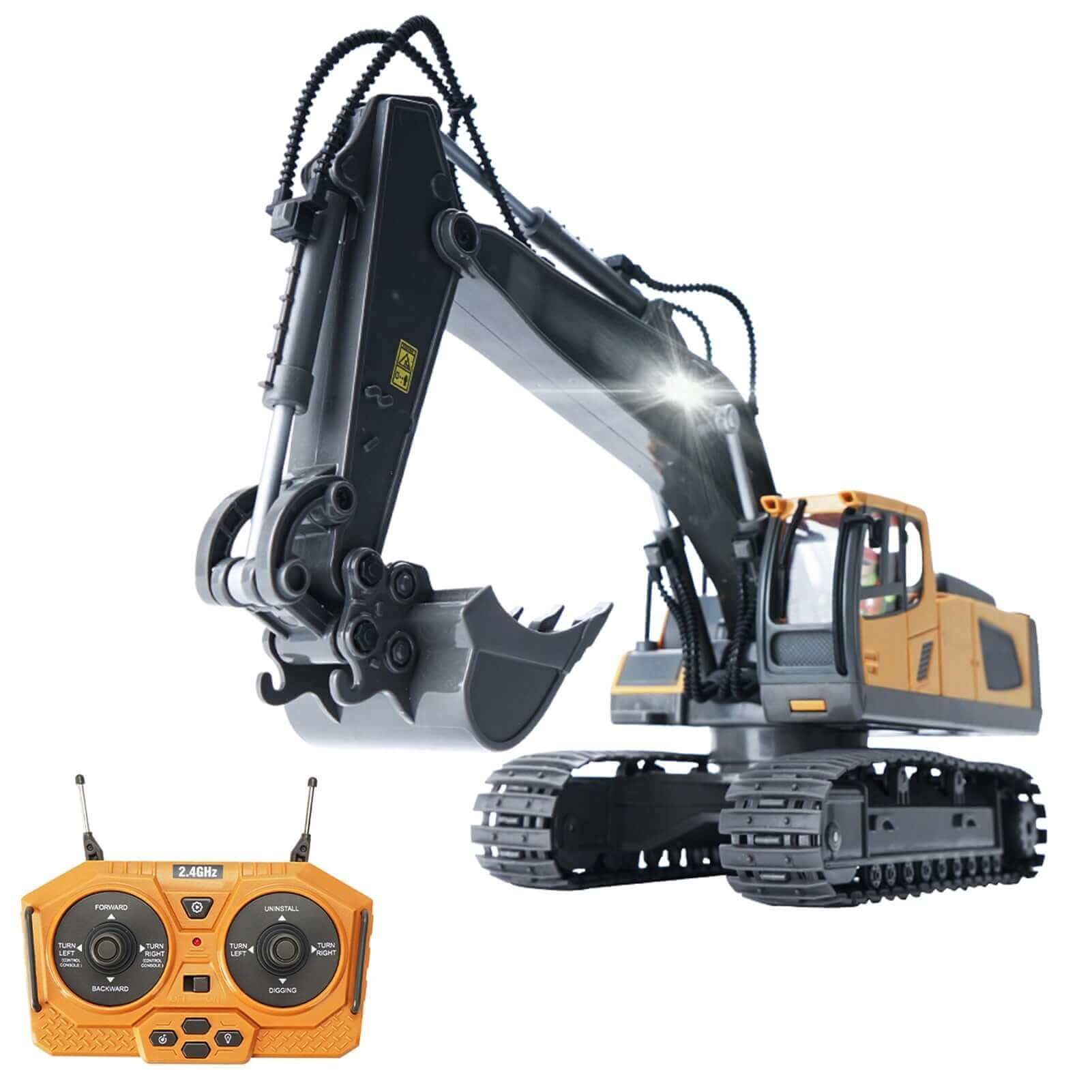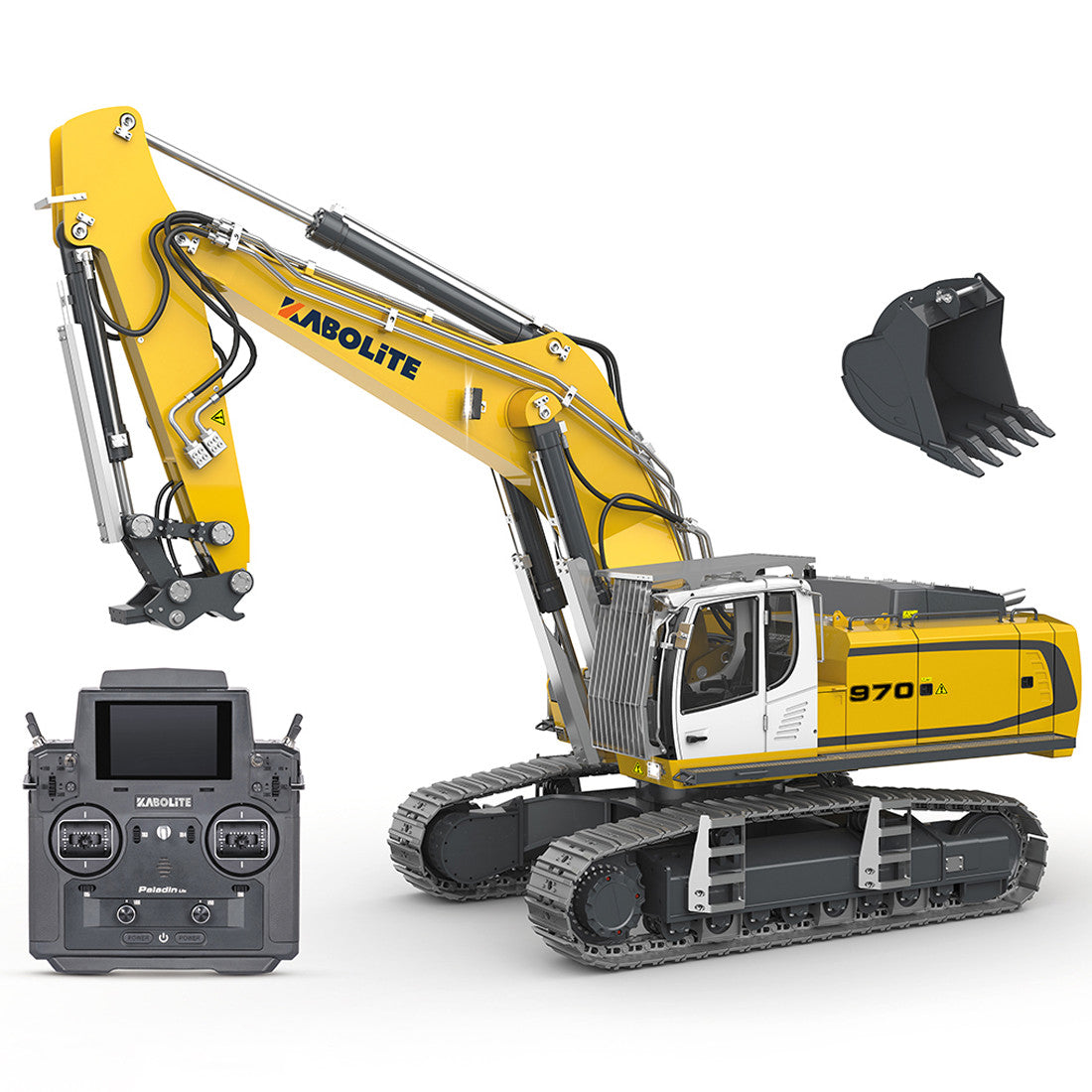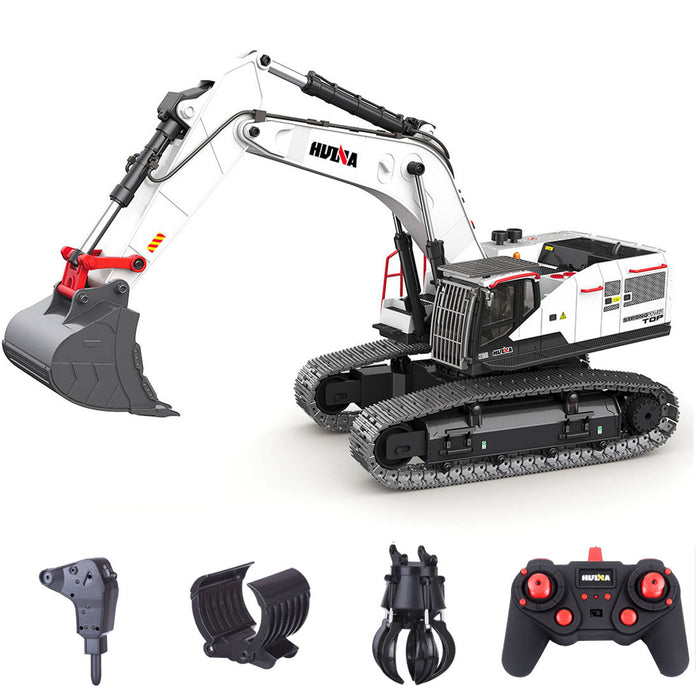What You Didn’t Know About the Safety Features of the remote control excavator
Comprehending Exactly How Excavator Works and Its Effect On Effectiveness
Excavators play a vital role in building and construction and mining procedures, counting on a complicated interaction of hydraulic and mechanical systems. Their capacity to do a range of tasks hinges on both their layout and the modern technology integrated within. Comprehending these elements can greatly influence functional effectiveness and performance. As developments remain to improve the market, one should think about how these adjustments will certainly affect future practices and efficiency.
The Basics of Excavator Mechanics

The Duty of Hydraulic Equipments in Excavators
At the heart of excavator procedure exists the hydraulic system, which plays a crucial role in powering the maker's features and activities. This system makes use of pressurized hydraulic liquid to move energy, allowing various activities such as lifting, excavating, and swinging. By using the principles of hydraulics, excavators can perform jobs with exceptional accuracy and pressure, boosting total operational efficiency.The hydraulic system contains key components, including shutoffs, pumps, and cylinders, which function together to control the circulation and direction of the fluid. When the driver engages the controls, the hydraulic liquid is guided to specific cylinders, translating the driver's commands right into physical motion. This system permits smooth and receptive actions, which are important in construction and excavation environments. double e volvo rc excavator. The performance of the hydraulic system straight impacts the efficiency and versatility of the excavator, making it an essential aspect in modern excavation procedures
Trick Parts of an Excavator
Understanding the crucial parts of an excavator is necessary for grasping just how this powerful equipment operates. An excavator is composed of numerous considerable components, consisting of the undercarriage, home, pail, arm, and boom. The undercarriage offers security and mobility, commonly including tracks or wheels to browse various surfaces. Your house includes the engine and hydraulic systems, permitting the driver to control movement and power the maker. The boom expands from your home, making it possible for vertical reach, while the arm attaches to the bucket, promoting digging and training operations.Additionally, the taxi houses the driver, geared up with controls for accurate maneuvering. Each of these parts plays an important function in the excavator's general capability, adding to its efficiency and performance on building and construction sites. Comprehending these components assists in optimizing and preserving excavator efficiency, guaranteeing jobs are finished securely and properly.
Attachment Flexibility and Its Advantages
Add-on flexibility is a crucial element of excavators, allowing operators to switch over in between numerous tools tailored for certain tasks. This adaptability not only enhances task performance yet additionally adds to cost-effectiveness by reducing the need for numerous equipments. Understanding the various sorts of add-ons available can significantly affect the general performance and functionality of an excavator on task sites.
Kinds of Add-ons
While excavators are primarily recognized for their digging capacities, their true adaptability hinges on the large variety of accessories offered. These accessories enhance the excavator's capability, permitting it to carry out various tasks beyond excavation. Usual accessories include containers (for digging and scooping), hydraulic thumbs (for grasping materials), and augers (for piercing holes) Grapples are utilized for relocating and managing debris, while rippers can separate tough surface areas. Other specialized add-ons, such as plates and plows, allow excavators to adjust to particular job demands. This variety not only raises the machine's utility across different markets, including demolition, landscaping, and building, however likewise allows drivers to tailor their tools to meet certain task needs efficiently.
Raised Work Performance
Making the most of work effectiveness is a key advantage of using different excavator attachments. Different add-ons permit an excavator to perform multiple jobs without requiring to switch equipment, saving important time and labor. Using a hydraulic hammer can break concrete while a pail attachment can excavate soil, allowing a smooth workflow. This adaptability lowers downtime related to equipment modifications and boosts productivity on-site. Furthermore, specialized add-ons improve precision in jobs such as grading or landscape design, leading to better results. The capability to adapt to different task demands not just simplifies procedures however likewise lessens the demand for added equipment, making sure that projects are completed quickly and successfully. On the whole, add-on versatility considerably adds to enhanced task effectiveness in excavation job.
Cost-Effectiveness and Adaptability
Cost-effectiveness is a substantial benefit of making use of functional excavator add-ons. These add-ons permit a solitary excavator to execute numerous jobs, minimizing the need for added equipment and labor - double e volvo rc excavator. By switching over between pails, hammers, and grapples, operators can take on various jobs, from digging to demolition, thereby making best use of tools use. This versatility not only reduces operational prices however additionally reduces downtime connected with changing tools. Furthermore, the capability to customize excavators with specialized accessories enhances efficiency, as they can efficiently manage varied jobs according to job demands. In conclusion, the mix of cost-effectiveness and convenience in excavator accessories adds to boosted functional efficiency and source allowance in construction and excavation tasks

Advanced Innovation in Modern Excavators
Modern excavators are progressively furnished with innovative innovation that changes excavation processes. Automation improves operations, while enhanced fuel efficiency minimizes operational prices. In addition, wise control systems improve accuracy and safety and security, marking a considerable development in excavation equipment.
Automation in Excavation Processes
As excavation innovation evolves, automation has actually become a crucial part in enhancing performance and accuracy on work sites. Modern excavators are outfitted with advanced automated systems that facilitate jobs such as grading, digging, and trenching with very little driver intervention. These systems use sensors, GPS, and artificial intelligence formulas to ensure exact positioning and deepness control, significantly minimizing the margin for mistake. In addition, automation enables operators to concentrate on calculated decision-making instead of hand-operated controls, bring about boosted efficiency in general. Such technologies not just enhance workflows but additionally boost safety and security by lessening human error in complex operations. The combination of automation in excavation procedures represents a substantial improvement in building technology, driving the market in the direction of higher performance and performance.
Enhanced Fuel Performance
Developments in technology have actually also led to significant enhancements in gas efficiency for contemporary excavators. Modern equipments are furnished with advanced engines that maximize power output while reducing fuel consumption. These engines utilize cutting-edge burning technologies, such as turbocharging and straight gas shot, to improve performance and performance. Additionally, lightweight materials in construction reduce general weight, permitting for much less power expense throughout procedure. The intro of variable speed controls enables operators to readjust engine efficiency according to particular tasks, further minimizing gas use. Therefore, these improvements not only reduced operational find more information costs yet likewise contribute to environmental sustainability by lowering exhausts. Generally, improved fuel efficiency in excavators is a necessary advancement that bolsters performance and financial feasibility in the building and construction market.
Smart Control Equipment
While operators browse increasingly complicated job websites, clever control systems in excavators have actually emerged as essential devices for enhancing performance and accuracy. These advanced innovations utilize formulas and sensors to next page monitor different criteria such as tons weight, terrain problems, and functional performance. By automatically changing hydraulic functions, wise systems enhance machine performance, resulting in boosted productivity and lowered wear on elements. Furthermore, drivers take advantage of instinctive interfaces that supply real-time responses and diagnostics, permitting for educated decision-making. This integration of modern technology not just improves procedures however likewise decreases human error, contributing to safer job settings. As the construction industry proceeds to advance, clever control systems will certainly play an essential role in shaping the future of excavator performance and effectiveness.
Enhancing Operational Effectiveness With Excavators
Excavators play an essential function in enhancing operational effectiveness across numerous building and excavation jobs. Their convenience permits for multiple jobs, consisting of excavating, material, and training handling, which simplifies workflows and minimizes the requirement for additional equipment. With powerful hydraulic systems, excavators can do heavy-duty tasks with accuracy, significantly lowering the moment needed to total jobs. The assimilation of advanced technology, such as general practitioner and automated controls, better maximizes their procedure, allowing drivers to accomplish higher accuracy and lower product waste. Furthermore, modern excavators are designed to eat less fuel and decrease exhausts, adding to both expense savings and environmental sustainability. By making use of excavators effectively, building and construction groups can enhance performance, fulfill job deadlines, and boost general site management. This multifunctionality and performance make excavators crucial devices in the contemporary building and construction landscape.
The Future of Excavators in Building and Mining Industries
As the construction and mining sectors develop, the future of excavators is positioned for significant transformation driven by technical development and altering operational demands. Developments in automation and expert system are improving excavator capabilities, permitting enhanced accuracy and efficiency in operations. Independent excavators are emerging, lowering the need for human intervention and decreasing the risk of accidents.Moreover, the assimilation of telematics and IoT innovation enables real-time surveillance of machine performance and anticipating upkeep, optimizing uptime. Green layouts, consisting of hybrid and electric designs, are acquiring traction, lining up with sustainability objectives within the industry.Additionally, making use of innovative materials and lighter designs improves fuel efficiency while preserving efficiency criteria. As these fads progression, excavators will certainly play an essential role in satisfying the raising demands for efficiency and security in construction and mining, eventually transforming functional landscapes.
Regularly Asked Questions
How Do Weather Influence Excavator Performance?

Climate condition greatly influence excavator have a peek here performance, as rainfall and mud can hinder traction and security, while severe temperature levels may influence hydraulic systems. Operators must adapt to these variables to ensure optimal functionality and safety and security throughout procedures.
What Safety Procedures Should Operators Comply With While Utilizing Excavators?
Safety actions for excavator drivers include putting on proper individual protective devices, carrying out pre-operation examinations, making sure proper communication with ground personnel, preserving a risk-free distance from above risks, and sticking to well established operational protocols to avoid crashes.
How Usually Should Excavators Be Kept for Optimal Efficiency?
Excavators must be kept frequently to assure peak performance, commonly every 250 operating hours or as specified by the maker. Routine checks improve integrity, avoid unforeseen failures, and extend the life expectancy of the devices.
What Is the Ordinary Lifespan of an Excavator?
The average lifespan of an excavator usually varies from 10,000 to 15,000 hours of operation. Factors influencing durability consist of maintenance methods, running conditions, and the quality of the equipment itself, impacting total performance and performance.

Can Excavators Run on Uneven Surface Effectively?
Excavators can operate successfully on irregular terrain because of their expressed layouts and adjustable tracks. These functions enable them to preserve stability and grip, making it possible for effective procedure in challenging environments frequently encountered in construction and landscape design tasks. Each of these parts plays a vital duty in the excavator's total performance, contributing to its effectiveness and performance on building and construction websites. Making the most of task effectiveness is a main advantage of using various excavator attachments. While operators navigate increasingly complex work websites, wise control systems in excavators have actually arised as crucial tools for boosting performance and accuracy. Excavators play a vital duty in enhancing operational performance throughout different construction and excavation jobs. Advances in automation and man-made intelligence are improving excavator abilities, permitting for improved precision and efficiency in procedures.